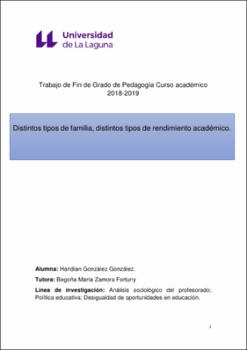Distintos tipos de familia, distintos tipos de rendimiento académico.
Author
González González, HaridianDate
2019Abstract
El análisis del rendimiento académico ha sido un concepto de gran interés en la
investigación de las ciencias sociales a lo largo de los años. Podríamos definir el
rendimiento académico como la diferencia entre el potencial que posee cada
alumno y su desempeño y desarrollo académico. Un ejemplo sería aquellos
alumnos/as que no han adquirido en el tiempo previsto, de acuerdo con los
programas establecidos y las capacidades intelectuales, los resultados que se
esperan de él.
Diversos estudios evidencian la gran influencia de la familia en el desarrollo del
aprendizaje del alumnado. La investigación en relación a los resultados de
aprendizaje de los estudiantes distingue tres grandes categorías de variables
familiares que afectan poderosamente el éxito escolar de los niños:
1) Actitud y conductas de los padres frente al aprendizaje;
2) Recursos relacionados con el aprendizaje y clima familiar
3) Estilos de crianza.
Teniendo en cuenta estas categorías, presupongo que también interviene la
estructura familiar y sus respectivas características, en el rendimiento
académico. Valoramos dentro del concepto de familia a las homoparentales,
monoparentales, extensas, nucleares, etc. Siguiendo esa hipótesis la revisión
teórica se centrará en desglosar los diferentes núcleos familiares identificando si
su configuración influye o tiene relación alguna con las variables anteriormente
citadas. The analysis of academic performance has been a concept of great interest in
social science research over the years.We could define the academic
performance as the difference between the potential that each student has and
their performance and academic development. An example would be those students who have not acquired in the foreseen time, according to the established
programs and the intellectual capacities, the results that are expected of him.
Several studies show the great influence of the family in the development of
student learning. Research in relation to student learning outcomes distinguishes
three broad categories of family variables that powerfully affect children's school
success:
Attitude and behavior of parents against learning;
2) Resources related to learning and family climate
3) Parenting styles. Taking these categories into account, I assume that the
family structure and its respective characteristics also intervene in academic
performance. We value within the concept of family homoparentales, single
parent, extensive, nuclear, etc. Following this hypothesis, the theoretical review
will focus on breaking down the different family nuclei, identifying if their
configuration influences or has any relation with the aforementioned variables





